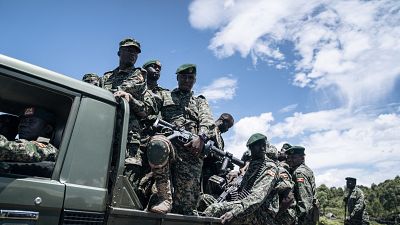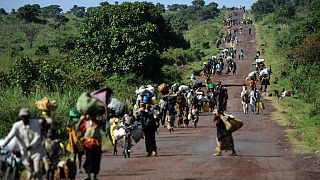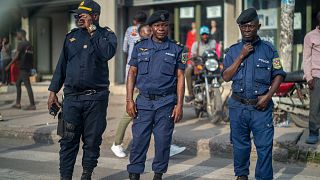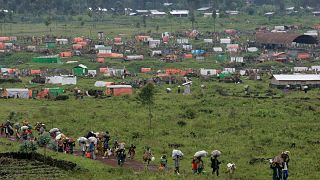Democratic Republic Of Congo
The regional EACRF force created in 2022 to halt the advance of the armed group M23 in the eastern Democratic Republic of Congo has since December recovered some of the rebel strongholds. But on the ground, the rebels are still there.
In November, Kenya, Uganda, Burundi and South Sudan - two countries where the armies are accused of possible war crimes and crimes against humanity - were asked by the Congolese authorities to deploy several thousand men to liberate areas conquered by the M23 over the past year.
According to independent UN experts, Rwanda - which has denied this - has also fought, alone or alongside the M23, the Congolese army and armed groups to control towns and strategic axes.
In Kibumba, Rumangabo and Bunagana (rebel strongholds north of Goma, the capital of North Kivu), EACRF officers were seen smiling at rebel leaders who were supposed to have been dismissed.
"They will kill me"
From April 18 to 21, a press trip involving AFP was organized by the EACRF to so-called "liberated" localities. Despite restrictions, some inhabitants were able to be interviewed.
"If they (the rebels) hear what I have to say, they will kill me," said a worried shopkeeper in Bunagana, a border post between the DRC and Uganda that was officially recaptured from the M23 on March 31 by the Ugandan army.
"The M23 are still there! The arrival of the EACRF soldiers has not changed anything, I am still paying taxes to the M23," he complained, saying that on the Congolese side, the border is still held by the rebels.
Pointing to a hilltop, other residents exclaim, "You see there, that's an M23 position!"
Despite promises from the EACRF, vehicle traffic has still not resumed on the 100-km road to Goma, except for a few trucks and motorcycles.
"The M23s still patrol this road every day," said a shopkeeper on the side of the Nationale 2, which is supposed to be under the control of Ugandan troops, about 20 km west of Bunagana.
''Truthful discussion"
On April 17, at a press conference in Goma, the EACRF chief of staff, Kenyan General Jeff Nyagah, welcomed the ceasefire, which would have "improved the withdrawal of M23 from the areas it occupied."
But four days later in Kinshasa, in the Council of Ministers, the new Minister of Defense, Jean-Pierre Bemba contradicted him.
Since mid-April, a "reinforcement of several positions by RDF/M23 terrorists" (Rwandan army/M23) has been noted. The movements spotted "presage attacks" against the Congolese army, he said.
According to Jean-Pierre Bemba, "the rebel M23/RDF attacked a patrol of Burundian elements" of the EACRF on April 15, about 30 kilometers west of Goma.
On April 12, armed men claiming to be "patriot fighters" carried out an attack in the village of Kibumba near Goma, which was immediately denounced by M23 leader Bertrand Bisimwa. On Twitter, he denounced a violation of the cease-fire and an attack by "the coalition of the Kinshasa government" against his troops.
Since late December, however, the regional force has regularly claimed to have replaced the rebels in the area. After the April 12 attack, it claimed to have "successfully repelled" a "local armed group. There was no mention of an M23 presence in Kibumba.
While the rebels and Rwandan army troops seem to have abandoned a few emblematic localities since the beginning of April - such as the village of Kishishe, where the UN accuses them of having massacred at least 171 civilians in November - their territorial hold on the area does not seem to have changed much.
In North Kivu, more than a million people remain displaced after fleeing the M23 and the Rwandan army. And Kinshasa is now calling for a "truthful discussion" to clarify the role of the regional force.












02:35
Central African Republic's major rebel groups to disarm, dissolve
00:56
Peace talks between DRC and M23 rebels 'moving in the right direction'
01:01
Trial of DRC's former Justice Minister Constant Mutamba postponed for two weeks
01:12
Eastern DRC tensions: UN points to Rwanda's role in AFC/M23 conflict
00:55
The Democratic Republic of Congo celebrates the centenary of Patrice Lumumba's birth
01:52
In Goma, solar power brings light and hope in Ndosho neighbourhood